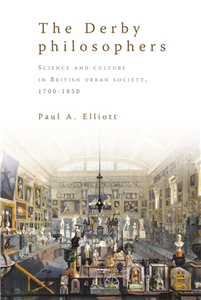Your Search Results
-
Promoted Content
-
Promoted Content
-
 Trusted Partner
Trusted Partner
-
 Trusted Partner
January 1982
Trusted Partner
January 1982Herr Sylvester wohnt unter dem Dach
Erzählungen
by Bingel, Horst / Nachwort von Weyrauch, Wolfgang
-
 Trusted Partner
Trusted Partner
-
 Trusted Partner
Trusted Partner
-
 Trusted Partner
Humanities & Social SciencesApril 2025
Trusted Partner
Humanities & Social SciencesApril 2025The Derby philosophers
Science and culture in British urban society, 1700–1850
by Paul A. Elliott
The Derby Philosophers focuses upon the activities of a group of Midland intellectuals that included the evolutionist and physician Erasmus Darwin, Rev. Thomas Gisborne the evangelical philosopher and poet, Robert Bage the novelist, Charles Sylvester the chemist and engineer, William George and his son Herbert Spencer, the internationally renowned evolutionist philosopher who coined the phrase 'survival of the fittest', and members of the Wedgwood and Strutt families. The book explores how, inspired by science and through educational activities, publications and institutions including the famous Derbyshire General Infirmary (1810) and Derby Arboretum (1840), the Derby philosophers strove to promote social, political and urban improvements with national and international consequences. Much more than a parochial history of one intellectual group or town, this book examines science, politics and culture during one of the most turbulent periods of British history.
-
 Trusted Partner
Humanities & Social SciencesAugust 2009
Trusted Partner
Humanities & Social SciencesAugust 2009The Derby philosophers
Science and culture in British urban society, 1700–1850
by Paul Elliot
The Derby Philosophers focuses upon the activities of a group of Midland intellectuals that included the evolutionist and physician Erasmus Darwin, Rev. Thomas Gisborne the evangelical philosopher and poet, Robert Bage the novelist, Charles Sylvester the chemist and engineer, William George and his son Herbert Spencer, the internationally renowned evolutionist philosopher who coined the phrase 'survival of the fittest', and members of the Wedgwood and Strutt families. The book explores how, inspired by science and through educational activities, publications and institutions including the famous Derbyshire General Infirmary (1810) and Derby Arboretum (1840), the Derby philosophers strove to promote social, political and urban improvements with national and international consequences. Much more than a parochial history of one intellectual group or town, this book examines science, politics and culture during one of the most turbulent periods of British history, an age of political and industrial revolutions in which the Derby philosophers were closely involved. ;
-
 Trusted Partner
Trusted Partner
-
 Trusted Partner
Trusted Partner
-
 Trusted Partner
January 2019
Trusted Partner
January 2019Vor dem Palast
Gespräche über Einar Schleef
by Corinne Orlowski
»Der Ort vor dem Palast ist der Ort der Transformation, des Figurwerdens, des Tragödiewerdens, er ist der eigentliche Ort des Theaters«, sagt die Theaterwissenschaftlerin Ulrike Haß im Gespräch. Dort, inszenierend und über das Theater schreibend (Droge Faust Parsifal), hat sich der Theatermann Schleef aufgehalten. Von dort aus hat er operiert. Aber wer war Einar Schleef (1944-2001)?Die Gespräche dieses Bandes kreisen die kontroverse Ausnahmeerscheinung und das Werk dieses Künstlers ein, der Regisseur, Autor, Maler, Darsteller, Filmer und Fotograf in einer Person war. Die Herausgeberin fragt: Was machte ihn aus? Welche Entdeckungen sind in den künstlerischen Disziplinen, die er beherrschte, zu machen? Was an den Erkenntnissen, Thesen, Provokationen und Demonstrationen, die Einar Schleefs Arbeiten bereithalten, verlangt danach, vorgezeigt und diskutiert, verwandelt und weitergegeben zu werden? Wo steht das Theater heute? Wie geht es weiter?Mit der Herausgeberin gesprochen haben: Sebastian Baumgarten, Bibiana Beglau, Jakob Fedler, Michael Freitag (über den Maler), Christine Groß, Ulrike Haß, Carl Hegemann, Regine Herrmann (über den Fotografen), Jürgen Holtz, Elfriede Jelinek, Wolfram Koch, Thomas Köck, Hans-Ulrich Müller-Schwefe (über den Autor), Armin Petras, Claus Peymann, Günther Rühle, Ulrich Rasche, Hans-Jürgen Syberberg, Heiner Sylvester (über den Filmer), Rita Thiele, Susan Todd, Martin Wuttke.
-
 Trusted Partner
Trusted Partner
-
 Trusted Partner
January 1976
Trusted Partner
January 1976Gerbert von Aurillac und das Quadrivium
Untersuchungen zur Bildung im Zeitalter der Ottonen
by Lindgren, Uta
-
 Trusted Partner
Humanities & Social SciencesNovember 2009
Trusted Partner
Humanities & Social SciencesNovember 2009British liberal internationalism, 1880–1930
Making progress?
by Casper Sylvest
This book explores the development, character, and legacy of the ideology of liberal internationalism in late nineteenth and early twentieth-century Britain. Liberal internationalism provided a powerful way of theorising and imagining international relations, and it dominated well-informed political discourse at a time when Britain was the most powerful country in the world. Its proponents focused on securing progress, generating order and enacting justice in international affairs. Liberal internationalism united a diverse group of intellectuals and public figures, and it left a lasting legacy in the twentieth century. This book elucidates the roots, trajectory, and diversity of liberal internationalism, focusing in particular on three intellectual languages - international law, philosophy and history - through which it was promulgated. Finally, it traces the impact of these ideas across the defining moment of the First World War. The liberal internationalist vision of the late-nineteenth century remained popular well into the twentieth century and forms an important backdrop to the development of the academic study of International Relations in Britain. ;
-
 Trusted Partner
Trusted Partner
-
 Trusted Partner
Humanities & Social SciencesNovember 2009
Trusted Partner
Humanities & Social SciencesNovember 2009British liberal internationalism, 1880–1930
by Casper Sylvest





















